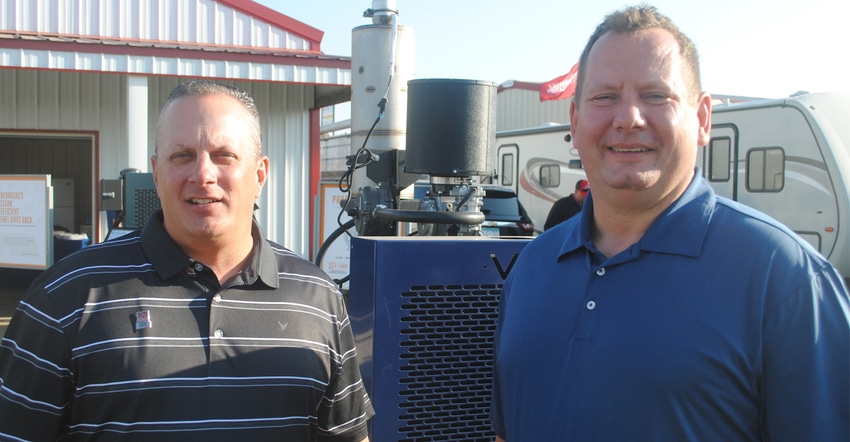
The Propane Education and Research Council is known for its 7-year-old Propane Farm Incentive Program, which assists hundreds of farmers yearly in converting systems to propane.
Through PFIP, farmers can earn up to $5,000 in incentives on the adoption of new propane-powered equipment, such as irrigation engines, water-heating systems, heat systems and propane-flame weed-control units.
“A high percentage of those farmers who have gained financial incentives are in Nebraska because of irrigation engines,” said Cinch Munson, PERC senior vice president of business development at Husker Harvest Day in September. “The reason they are switching to propane is because of its efficiency, reliability and power.
“It is interesting to note that the high-tech propane engines being developed now are actually simpler than other models, because manufacturers know that having low maintenance equipment is important to producers.”
As part of the incentive program, producers provide some data and information about their equipment to PERC. This information helps the organization research and develop new propane-powered equipment. Also, it helps manufacturers make improvements, especially in efficiency, to their product lines.
Propane-powered engines
In that way, PERC serves agriculture by getting in on ground-level partnerships for innovations in engine efficiencies, which especially benefit irrigators. An example includes the November release of a 11.8-liter Zenith Power Products engine, designed and optimized for industrial applications like irrigation. The new technology, which was developed in partnership with PERC, earned Zenith an innovation award by the World LPG Association.
“New propane-powered engines are highly efficient, cost-effective and easily meet increasing environmental standards,” said Mike Newland, PERC director of agriculture business development. “As we continue to build our portfolio of propane-powered engines, we work directly with manufacturers to ensure we are creating engines that provide an optimal solution to the challenges of today’s producers.”
The new Zenith engine lowers operating costs by decreasing fuel consumption and providing higher reliability and less maintenance, along with lowering engine costs and emissions, Newland said.
Dual-fuel system
PERC research and development has also been instrumental in the 2Fuels dual-fuel system technology, which offers producers the opportunity to use propane in existing diesel engines to provide additional power, savings and emissions compliancy, without having to replace the diesel engine.
“The dual-fuel system is an effective way for farmers to utilize propane on their farms for fuel savings, lower emissions and energy independence, all while continuing to use the equipment they already have,” Newland said.
The 2Fuel system, manufactured by 2Fuel Technologies, is designed to convert conventional diesel engines to operate on a blend of both propane and diesel. The company is the first to produce a system that is certified by the California Air Resources Board and has achieved original equipment manufacturer certification from the U.S. Environmental Protection Agency.
PERC offers this new system, as an effective solution for California producers who need to meet strict CARB regulations, as well as farmers across the country who want to bring their Tier 2 or 3 diesel engines into compliance without buying a new engine.
Both Newland and Munson said that environmental standards and a drive for better efficiency and flexibility are catalysts for much of the research and development for PERC and its partnerships with ag manufacturers.
When it comes to winter propane supplies for farmers, Munson said propane companies have made significant investments in energy transportation and storage to meet the demand of agriculture consumers. Fuel prices fluctuate based on seasonality and demand, Munson noted. “It’s just a good idea to always be sure to communicate about your needs with your distributor.”
You can learn more at propane.com/agriculture.
About the Author(s)
You May Also Like






